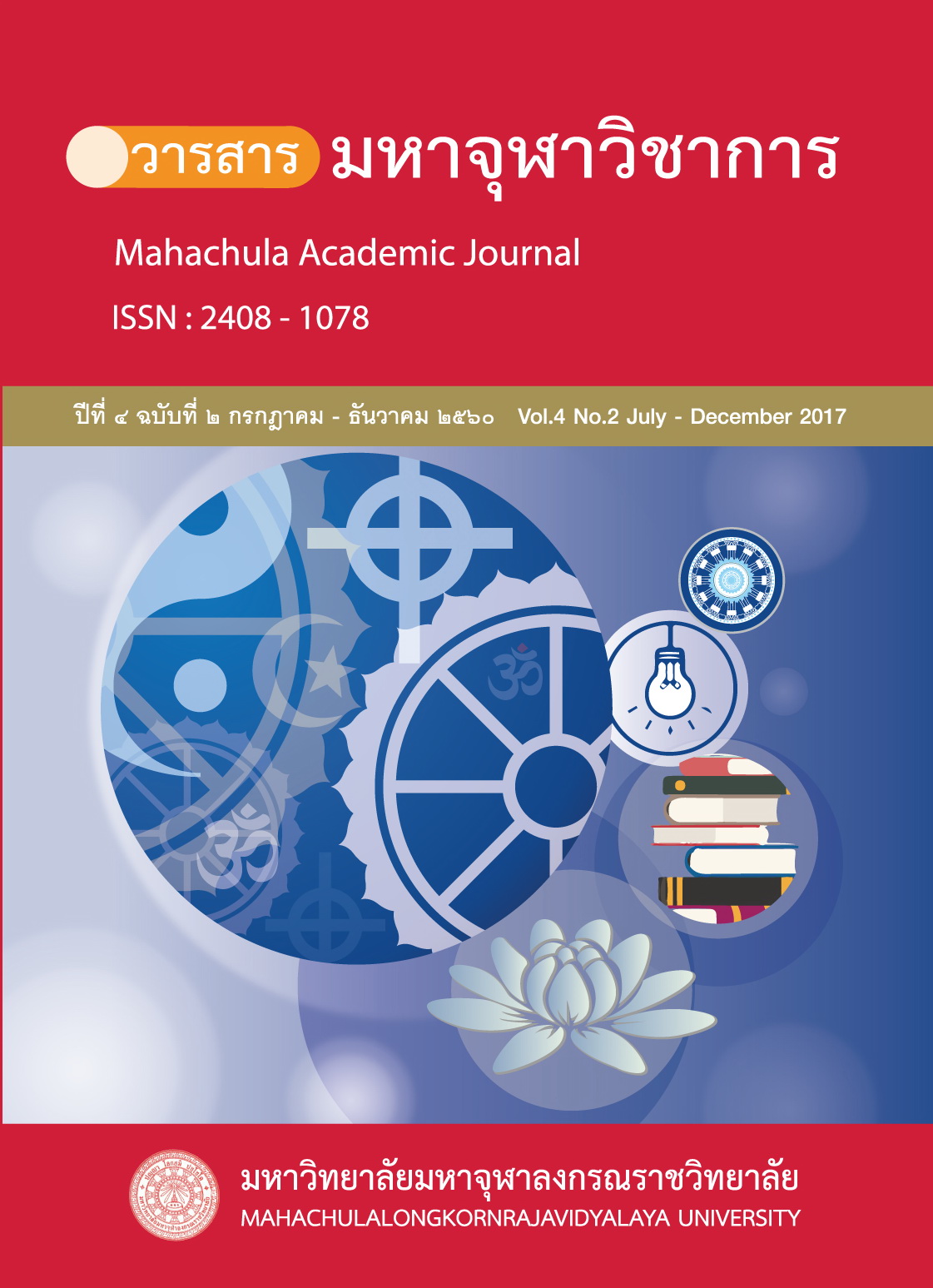Taking the Philosophy of Sufficiency Economy applied to develop the community economyFor the case Ban Tonnalab Moo ๑, Tonnalap sub district, Bandung, Udon Thani
Main Article Content
Abstract
This research paper has two objectives: ๑) to study the mechanisms and processes of bringing the sufficiency economy for adaptation of community under the context of the present economic system, and ๒) to analyze the way to bring the philosophy of sufficient economy being applied for community development sustainably.
The results of this research were as follows : Ban Tonnalab community was a capable community based on the awareness of community in taking part for helping each other in their community. They have a harmony, love, kindness, generosity towards each other. They could analyze problems, chose a solution to solve the problem successfully, and then lead to solve the other problems of community; thereby this community can stand on themselves with dignity.The factor impacted to the strength of the community was the application of the Philosophy of Sufficiency Economy as the main procedure by following the ๓-loops principle ๒ conditions for the development of community economics. The villagers were developed and participated in all stages of activities. There had also been the developers and academics from outside encouraged and supported them through community activities such as rice-bank, community-forest group, saving group, organic farmer group, community mills, community stores, that lead to the strong and sustainable process and won the model of Village of Sufficient Economy award from the Ministry of Interior in ๒๐๑๑.
Article Details
References
กรมการพัฒนาชุมชน.แผนยุทธศาตร์เศรษฐกิจชุมชนพึ่งตนเอง พ.ศ. ๒๕๔๒-๒๕๔๔. กรุงเทพมหานคร: โรงพิมพ์ส่วนท้องถิ่น, ๒๕๔๒.
จิราณีย์ พันมูล. "กระบวนการพัฒนาชุมชนสู่วิถีพอเพียง : กรณีศึกษาบ้านนาเวียง อำเภอเกาะคา จังหวัดลำปาง". วิทยานิพนธ์ปริญญามหาบัณฑิต. สถาบันบัณฑิตพัฒนบริหารศาตร์, ๒๕๕๔.
ใจมานัส พลอยดี. "ปัจจัยที่มีผลต่อความสำเร็จและความล้มเหลวของธุรกิจชุมชน : การเปรียบเทียบภาพรวมและภาพย่อย (อ.คำเขื่อนแก้ว จ.ยโสธร และอ.ลานสกา จ.นครศรีธรรมราช)". วิทยานิพนธ์เศรษฐศาตร์มหาบัณฑิต. จุฬาลงกรณ์มหาวิทยาลัย, ๒๕๕๔.
ฉัตรทิพย์ นาถสุภา. แนวคิดเศรษฐกิจชุมชนเสนอทางทฤษฎีในบริบทต่างสังคม. กรุงเทพมหานคร: อมรินทร์พริ้นติ้งแอนพลับลิชชิ่ง, ๒๕๔๐.
ชวาวุฒิ ลาภมาก. "ศึกษารูปแบบความรู้และกระบวนการขับเคลื่อนความรู้ตามแนวทฤษฏีเศรษฐกิจพอเพียง : กรณีชุมชนธรณีคำ แขวงโคกแฝด เขตหนองจอก กรุงเทพมหานคร". วิทยานิพนธ์ปริญญามหาบันฑิต. สถาบันบัณฑิตพัฒนบริหาร, ๒๕๕๓.
นิธิ เอียวศรีวงศ์. คนจนกับนโยบายการทำให้จนกับรัฐ. กรุงเทพมหานคร: โรงพิมพ์เรือนแก้วการพิมพ์, ๒๕๔๓.
ประเวศ วะสี. เศรษฐกิจพอเพียงและประชาสังคม แนวทางพลิกฟื้นเศรษฐกิจสังคม. กรุงเทพมหานคร: พิมพ์ดี, ๒๕๔๔.
ไพบูลย์ วัฒนศิริธรรม. แนวคิดเกี่ยวกับการพัฒนาเศรษฐกิจชุมชน. กรุงเทพมหานคร : เอดิสันเพรสปรดักส์, ๒๕๔๒.
มนุญ มุกข์ประดิษฐ์. "วิเคราะห์ปรัชญาเศรษฐกิจพอเพียงอันเนื่องมาจากพระราชดำหริกับหลักธรรมในพระพุทธศาสนา". วิทยานิพนธ์ดุษฎีบัณฑิต.บัณฑิตวิทยาลัย มหาวิทยาลัยมห่จุฬาลงกรณราชวิทยาลัย, ๒๕๒๘.
มงคล ด่านธานินทร์. เศรษฐกิจชุมชนพึ่งตนเองเชิงระบบ. กรุงเทพมหานคร : ซีเอ็ดยูเคชัน. มหาดไทย, ๒๕๔๑.
มัทนา พนานิรามัย และคณะ. "ความสัมพันธ์ระหว่างปัจจัยด้านประชากร สังคมเศรษฐกิจ วัฒนธรรม ต่อความเป็นอยู่ที่ดีและความเข้มแข็งของชุมชนท้องถิ่นไทย". รายงานผลการวิจัย สถาบันทรัพยากรมนุษย์ มหาวิทยาลัยธรรมศาสตร์, ๒๕๔๗.
สุนัย เศรษฐ์บุญสร้าง. แนวทางปฏิบัติ ๗ ขั้นสู้วิถีเศรษฐกิจพอเพียงจากแนวปฏิบัติสู่แนวคิดทางทฤษฎีของเศรษฐกิจพอเพียง. กรุงเทพมหานคร : ซีเอ็ดยูเคชั่น, ๒๕๔๙.
สุภางค์ จันทวานิช. การวิเคราะห์ข้อมูลในการวิจัยเชิงคุณภาพ. พิมพ์ครั้งที่ ๘. กรุงเทพมหานคร: โรงพิมพ์จุฬาลงกรณ์มหาวิทยาลัย, ๒๕๕๑.
เว็บไซต์
ธเนศ ศรีชัยลำพันธ์. การพัฒนาเศรษฐกิจชุมชน. [ออนไลน์]. แหล่งที่มา: http://fuangfah.econ.cmu.ac.th/teacher/thanes/files/Perfect%20Book2017.pdf [๑๕ มกราคม ๒๕๕๖].


